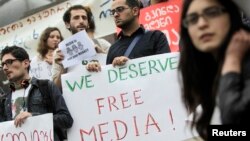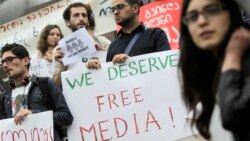The U.S. Acting Assistant Secretary of State for Democracy, Human Rights and Labor Affairs Uzra Zeya discussed in a public forum in Washington DC how the United States advances media freedom.
“First, [we] . . . actively engage governments both publicly and privately . . . addressing specific cases of imprisoned journalists, new legislation that restricts certain types of expression, and existing legal framework that sanction the locking-up of journalists in the name of security,” Acting Assistant Secretary Zeya said.
“We remind governments that allowing free expression increases rather than diminishes their chances of long-term stability and prosperity. And . . . we encourage other countries to stand with those journalists brave enough to speak out against corruption, authoritarianism, and other threats to a free society.”
“Second, we work in multilateral forums to hold governments accountable to their human rights obligations, including those specified in the Universal Declaration of Human Rights and the International Covenant on Civil and Political Rights,” Ms. Zeya said.
“This includes supporting United Nations resolutions on freedom of expression, [such as] the Human Rights Council resolution on safety for journalists . . . and the resolution on internet freedom.”
“Third . . . it is a priority for the State Department to support media freedom through foreign assistance,” Ms. Zeya continued.
“[We] funds programs in more than 40 countries that build the capacity for media actors to effectively investigate and report in restrictive and dangerous environments. Our internet freedom programs support technologies that enable citizen-journalists and activists to report on human rights developments and to protect themselves from threats both online and offline. These tools give bloggers access to the web when they would otherwise be shut off from the rest of the world . . . And since 2007, The Bureau of Democracy, Human Rights and Labor has provided more than $1 million in assistance for investigative journalists and bloggers and other media professionals who are under threat.”
“Finally, we speak directly with civil society, with non-government organizations and journalists, to gain a fuller picture of the situation on the ground,” Ms. Zeya said. “[This is] how we support media freedom on a daily basis . . . We believe that every day should be World Press Freedom Day.”
“First, [we] . . . actively engage governments both publicly and privately . . . addressing specific cases of imprisoned journalists, new legislation that restricts certain types of expression, and existing legal framework that sanction the locking-up of journalists in the name of security,” Acting Assistant Secretary Zeya said.
“We remind governments that allowing free expression increases rather than diminishes their chances of long-term stability and prosperity. And . . . we encourage other countries to stand with those journalists brave enough to speak out against corruption, authoritarianism, and other threats to a free society.”
“Second, we work in multilateral forums to hold governments accountable to their human rights obligations, including those specified in the Universal Declaration of Human Rights and the International Covenant on Civil and Political Rights,” Ms. Zeya said.
“This includes supporting United Nations resolutions on freedom of expression, [such as] the Human Rights Council resolution on safety for journalists . . . and the resolution on internet freedom.”
“Third . . . it is a priority for the State Department to support media freedom through foreign assistance,” Ms. Zeya continued.
“[We] funds programs in more than 40 countries that build the capacity for media actors to effectively investigate and report in restrictive and dangerous environments. Our internet freedom programs support technologies that enable citizen-journalists and activists to report on human rights developments and to protect themselves from threats both online and offline. These tools give bloggers access to the web when they would otherwise be shut off from the rest of the world . . . And since 2007, The Bureau of Democracy, Human Rights and Labor has provided more than $1 million in assistance for investigative journalists and bloggers and other media professionals who are under threat.”
“Finally, we speak directly with civil society, with non-government organizations and journalists, to gain a fuller picture of the situation on the ground,” Ms. Zeya said. “[This is] how we support media freedom on a daily basis . . . We believe that every day should be World Press Freedom Day.”






